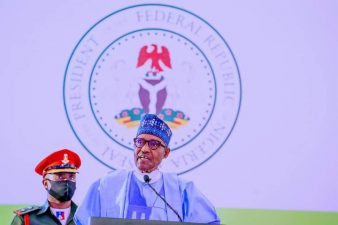*As IMF chief says things more likely to get worse
*As media reports say US inflation causing voter anger, running near 4-decade high
*Biden calls OPEC+ a disappointment for cutting, not increasing oil production
OPEC+ countries decided this week to cut oil production by 2 million barrels per day. The move is expected to raise prices at the pump even more. President Biden, on his way to New York and New Jersey on Thursday for high-dollar Democratic fundraisers, called the OPEC decision “a disappointment.”
By KEMI KASUMU with agencies’ reports
It has been reported that countries making up to one-third of the world’s economy will have at least two quarters of contraction this 2022 or next year 2023 as Western sanctions against Russia over its military operations in Ukraine are already disrupting global markets.
The DEFENDER gathered that Kristalina Georgieva, Managing Director of the International Monetary Fund (IMF), corroborated this new reality when she told an audience at Georgetown University on Thursday that “things are more likely to get worse before it gets better.”
She said Moscow’s military operation she called invasion of Ukraine in February dramatically changed the IMF’s outlook. “The risks of recession are rising,” she said.
The U.S. economy has contracted for two straight quarters, which is part of the informal definition of a recession, although economists say hiring has been generally strong this year.
According to Agency reports, the IMF gave its stark economic outlook less than a month before the midterm elections. The Biden administration and congressional Democrats are saddled with voter anger over inflation, which is running near a four-decade high.
American workers have effectively endured the biggest pay cut in a quarter century, according to data released this week by the Federal Reserve.
“We find that a majority of employed workers’ real (inflation-adjusted) wages have failed to keep up with inflation in the past year,” said researchers at the Federal Reserve Bank in Dallas. “For these workers, the median decline in real wages is a little more than 8.5%. Taken together, these outcomes appear to be the most severe faced by employed workers over the past 25 years.”
Making ends meet was tougher for U.S. households this summer as the average price of gasoline topped a record $5 per gallon. Gas prices have risen again by about 20 cents per gallon from their mid-September lows.
OPEC+ countries decided this week to cut oil production by 2 million barrels per day. The move is expected to raise prices at the pump even more.
President Biden, on his way to New York and New Jersey on Thursday for high-dollar Democratic fundraisers, called the OPEC decision “a disappointment.”
Republicans on the House Ways and Means Committee said there is “little optimism for a good jobs report” on Friday, when the Labor Department releases payroll numbers for September. They noted that more than 90% of corporate CEOs surveyed by CNBC believe there will be a recession in the next year, and just a third believe it will be a “short” or “mild” recession.
“With a majority of workers stressed about their finances amid rising prices, more than 20% report they’ve tapped into emergency savings to pay their bills, while another 20% report working extra hours,” the committee Republicans said in a statement.
Ms. Georgieva said the IMF has downgraded its global growth projections three times. It now expects growth rates of 3.2% for 2022 and 2.9% for 2023.
The ongoing COVID-19 pandemic, rising inflation and worsening climate conditions are hurting world economies and exacerbating other crises such as food insecurity and high debt levels among lower-income countries.
“And, even when growth is positive, it will feel like a recession because of shrinking real incomes and rising prices,” Ms. Georgieva said.
Central banks around the world are raising interest rates in hopes of taming inflation. The Fed has been the most aggressive with interest rate hikes, though central banks from Asia to England have begun to raise rates as well.
Chicago Federal Reserve Bank President Charles Evans said Thursday that the central bank’s policy rate is likely headed to 4.5% to 4.75% by spring. The current target rate is 3.0% to 3.25% after the central bank raised it 0.75 percentage points in September.
“We have further to go” on rate hikes, Mr. Evans said at an annual meeting of the Illinois Chamber of Commerce. “Inflation is high right now, and we need a more restrictive setting of monetary policy.”
Ms. Georgieva said that “tightening monetary policy too much and too fast – and doing so in a synchronized manner across countries – could push many economies into prolonged recession.”
“We are experiencing a fundamental shift in the global economy, from a world of relative predictability … to a world with more fragility — greater uncertainty, higher economic volatility, geopolitical confrontations, and more frequent and devastating natural disasters,” she said.
Many countries are feeling the economic effects of the invasion of Ukraine, and the IMF’s grim projections are in line with other forecasts for declines in growth.
The Organization for Economic Cooperation and Development last week said the global economy is set to lose $2.8 trillion in output in 2023 because of the war.




